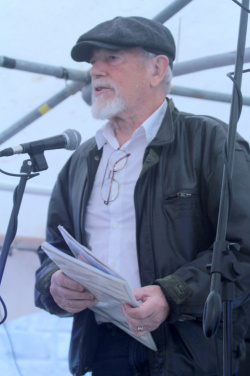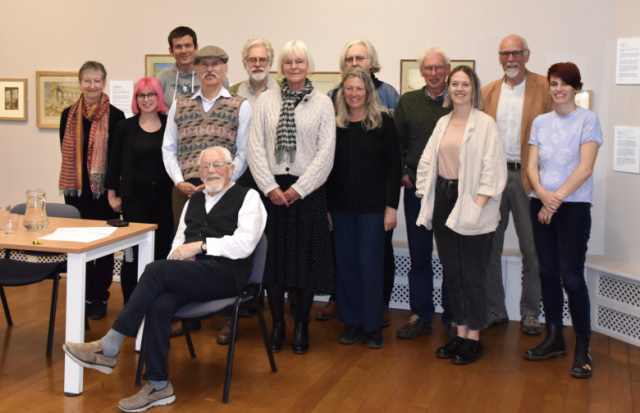‘The most beautiful light’: poets say sad goodbye to John Foggin

A much-loved and admired poet from Yorkshire who gained a significant circle of friends in the wider poetry world because of his enthusiasm and passion for his craft, has died at the age of 80 after a long illness. His family announced his death via social media thus: “It is with great sadness that Joan (Flo) and family share this news. Our beloved John passed away peacefully at home on Wednesday evening. There are no words to describe how much we'll miss him.”
A poet that John highly regarded as his mentor, the Forward prize-winner Kim Moore said: “I met John Foggin in 2011 at a Poetry Business workshop. I wrote something that I read out in the workshop, and he emailed to ask for a copy, and we never really stopped swapping ideas and poems since then. When John decides he’s going to be your friend, it’s like having the most beautiful light on you – a light that sees all the good things about you, even the bits you don’t understand yourself, and then tells you about them so much and so often you can’t help but start to believe them.
“As well as being the most fantastic friend, John was also a wonderful poet. His work and interests ranged far and wide, from Greek mythology to mining disasters, from works of art to writing about landscape. He was fascinated by stories and how we tell them, always brimming full of ideas and ready to sweep you along in his enthusiasms.”
John Foggin – often known as ‘Foggs’ - published a number of pamphlets and collections. His most recent collection, in 2022, was titled Pressed For Time. Over a spell of several years he also won a number of national poetry competitions. Despite this success he remained an assiduous attender of poetry courses and workshops, always working to improve his craft, and to find and create material for his poetry publications.
For a number of years he was also co-organiser of the poetry open-mic night Puzzle Hall Poets in Sowerby Bridge, West Yorkshire, with fellow compere Bob Horne.
Bob said: “John's collection Outlaws and Fallen Angels was the first published by Calder Valley Poetry, in January 2016. Since then, I have published Dark Watchers in 2019 and Pressed for Time last year. Rereading them now, in his voice – and he was a superb reader – is to be simultaneously moved and amazed. I'm deeply affected by knowing that I'll never hear that voice again, but above all in wonder at the insight and sensitivity, the sheer breadth, of his poetry.
“When he was told that his cancer was terminal, we started working on Pressed for Time. It was his final poetic statement and for six months, through increasing difficulties as his health slowly worsened, he never lost his meticulous editing perceptions, his thoroughness, and the fascination for language which had been his passion for so long. He never lost his sense of humour either. We had a wonderful launch at the gallery in Brighouse library, when many fellow poets read a poem each as part of the evening. It was the last time most of those poets would see John.
“John and I organised the Puzzle Hall Poets together for seven years. John ran the open mic, and he was inspirational. He listened closely to readers, often making notes, and was always generous, witty and supportive in his comments. In fact, this generosity was the hallmark of his character. I first recognised this 40 years ago when I knew him through education and saw how he respected all pupils. He was generous to organisers of poetry gatherings, always happy to drive long distances, whatever the weather, in support of an event.
“It's a week since John died and each day I realise more and more what a great and lovely man he was and how lucky I am to have known such an exceptional person.”

He came late to the poetry world, not really writing seriously until he was almost 70. He described himself proudly as a northern poet, arguing that language is formed by the places we come from. He attended university at Durham and Newcastle, and then taught in Middlesbrough, Newcastle, and Leeds.
Tragedy struck John and his family when in 1992 his 21-year-old adopted son David took his own life. Years later he wrote about this in a blog in which he said: “The sense that I bear a responsibility for it will never leave me, or his mother, his sister, his brothers. All I can do is share the story.”
In another blog he wrote about his enthusiasm for the “inspirational” Kim Moore, and the many residential courses she has led. In his blog he said that Kim had “taught me how to be rigorous with my own stuff, how to read, how to breathe through poems with long sentences (we both like those). She helped me to write honestly about the death of my son, and to find a language to frame it in. She gave me (and others) the example of her own courage in confronting personal trauma in her poetry, and also (for me) the way in which the myths of transformation can be a holding frame for our own stories. She has never stopped encouraging me to believe I can do it. Whatever ‘it’ is.”
As a measure of the huge love and respect in which John Foggin was held, a number of his poetry friends have contributed to a collection of writing in his memory. The festschrift, already amounting to more than 60 poems and tributes, was suggested by poet Lydia McPherson.
The poet Steve Ely said: “I first met John Foggin in April 2014, when I read with Michael Brown, Kim Moore and Michael Stewart at the Marsden Cuckoo Festival. John and I subsequently became friends, and I became an admirer of his fiercely compassionate, historically and culturally literate poetry - and his unrivalled ability to write astonishingly accomplished work in workshop settings.”
Freda Davis, John’s predecessor as organiser at Puzzle Hall Poets, said: “I was in awe of his unbroken record of teaching and guiding others in writing. I love his poetry which sits in my mind alongside that of the poets we learned about in school. Such a wide vocabulary, such a sense of place and time, and a detachment that allowed him to embody the spirits of past ages."
Kim Moore added: “In a world where there is never enough time, John always found time for me, and I will never, ever forget that gift. I’m glad that he’s finally at peace, but I’m so bloody sad that he’s gone. I’m selfishly sad that I won’t get to talk to him again, that I won’t feel that sense of bemusement when he insists on telling me I’m wonderful, that I won’t get to read any more new poems, or talk to him about poetry, send him a reading list or gossip about poets.
“My last memory of John is at his book launch for Pressed for Time in May 2022, the last time I would see him. I had a terrible feeling I wouldn’t see him again so I made the two and a half hour drive over from Cumbria. I am so glad I did. He looked his usual dapper self in a flowing white shirt, if a little more tired than usual – but he was so happy to be surrounded by friends. That is how I want to remember him.
“I will also remember him by keeping his wonderful poems alive of course. The last poem in Pressed for Time takes us back, in true John fashion, to the writing of the Venerable Bede who wrote that ‘the life of man on earth is like the swift flight of a single sparrow through the banqueting hall’. It seems extraordinary to me that John wrote this poem in the midst of his illness, whilst reconciling himself to death and left us with it as the final poem in the collection. It comforts me to read it, to think of him as a sparrow, ‘out into the turbulence of everywhere/and who knows what happens next.’ ”
IN THE MEANTIME
by John Foggin
because that’s how it is, the sparrow
flying into the mead hall, bewildered
by smoke-reek, gusts of beer-breath,
out of the wild dark and into the half-
light of embers, sweat, the steam
of fermenting rushes , and maybe
a harp and an epic that means nothing
in a language it doesn’t know, this sparrow,
frantic to be out there, and maybe
it perches on a tarry roof beam, catches
a wingtip, comes up against thatch
like a moth on a curtain, and it beats
its wings, it beats its wings, it tastes
a wind with the scent of rain, the thin
smell of snow, of stars, and somehow
it's out into the turbulence of everywhere,
and who knows what happens next.

Picture shows John Foggin, in foreground, at the launch of his final collection Pressed For Time in 2022, with, from left, Emma Storr, Charlotte Wetton, Jack Faricy, Anthony Costello, Nigel King, Carole Bromley, Alison Lock, Phil Foster (behind Alison), David Underdown, Natalie Rees, Bob Horne, and Kim Moore







John Marks
Wed 28th Jun 2023 00:50
John Donne
No man is an Iland, intire of itselfe; every man
is a peece of the Continent, a part of the maine;
if a Clod bee washed away by the Sea, Europe
is the lesse, as well as if a Promontorie were, as
well as if a Manor of thy friends or of thine
owne were; any mans death diminishes me,j
because I am involved in Mankinde;
And therefore never send to know for whom
the bell tolls; It tolls for thee.